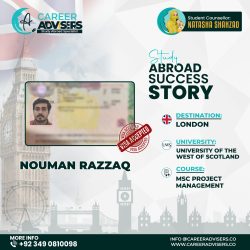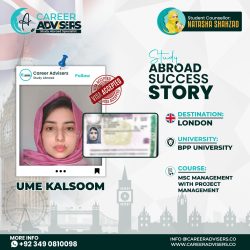

Study Visa in Rawalpindi: How to Apply for Law, LLM, Management, Health, and IT Programmes
Study Visa in Rawalpindi
Rawalpindi has developed into one of Pakistan’s most active educational centres for students seeking higher education abroad. Every year, thousands of students from this region aim to study in countries such as the United Kingdom, Canada, and Australia, which offer world-class universities and career-focused degrees. Among the most popular disciplines are Law, LLM, Management, Health, and IT, each offering international exposure and professional development. Understanding how to apply for admission and a study visa is crucial for success. With the right preparation and expert guidance, students in Rawalpindi can turn their dream of global education into reality.
Table of Contents
1. Understanding the Study Visa Process
A study visa is an official authorisation that allows international students to study full-time at accredited institutions abroad. In the UK, this is known as the Student Route visa, while in Canada, it is a Study Permit, and in Australia, a Subclass 500 visa. The process begins when a student receives an offer letter or Confirmation of Acceptance for Studies (CAS) from a university. Applicants must then demonstrate adequate financial support to cover tuition fees and living costs, provide proof of English language proficiency (IELTS, TOEFL, or Oxford ELLT), and show genuine study intentions. After submitting the online application, students attend a biometric appointment at VFS Global Islamabad, followed by an interview if required. Once approved, the visa enables students to travel and commence their studies abroad.
2. Law and LLM Programmes
Law remains one of the most prestigious and rewarding academic fields for Pakistani students. Many apply for LLB programmes to gain foundational legal education, while graduates often pursue LLM (Master of Laws) degrees for specialisation in fields such as International Law, Human Rights, or Corporate Law. UK universities like the University of Birmingham, the University of Leeds, and the University of Nottingham offer globally recognised law qualifications. To apply, students must submit academic transcripts, a personal statement outlining their motivation, and letters of recommendation. These degrees provide opportunities to work with international firms, NGOs, and research institutions. Moreover, studying law abroad helps students understand global legal frameworks, sharpening their analytical and advocacy skills — both essential for future legal practice in Pakistan or beyond.
3. Management and Business Studies
Business and management degrees continue to attract large numbers of students from Rawalpindi who want to become future leaders and entrepreneurs. Courses such as MBA, MSc Management, and MSc International Business are offered by top universities, including Warwick, Manchester, and Glasgow. These degrees combine academic learning with real-world business exposure, covering leadership, marketing, strategy, and finance. Applicants usually need an undergraduate degree, strong communication skills, and in some cases, relevant work experience. Management graduates benefit from global networking, career development workshops, and internships that prepare them for leadership roles in both multinational and local firms. Many Pakistani students also leverage these programmes to establish their own start-ups or join consultancy and management roles upon returning home.
4. Health and Medical Sciences
Health and Allied Sciences are highly respected fields with a growing demand for qualified professionals worldwide. Students from Rawalpindi often apply for degrees in Public Health, Nursing, Biomedical Sciences, and Health Management. Universities such as the University of Edinburgh, the University of Southampton, and King’s College London are popular for their strong research facilities and practical learning environments. Applicants must submit academic records, proof of English proficiency, and a personal statement highlighting their motivation to improve healthcare outcomes. These programmes offer international clinical exposure, advanced research opportunities, and insight into global healthcare policies. After graduation, students can work in hospitals, public health departments, or international organisations such as the WHO or UNICEF, contributing meaningfully to global well-being.
5. Information Technology (IT) and Computing
The field of Information Technology (IT) is one of the fastest-growing study areas among Pakistani youth. Programmes such as Computer Science, Artificial Intelligence, Cybersecurity, Data Analytics, and Software Engineering are in high demand. Leading universities, including the University of Bristol, University of Kent, and University of Birmingham, provide top-tier IT education with research labs, coding bootcamps, and internship opportunities. Applicants should demonstrate strong analytical and problem-solving skills, along with an interest in innovation and technology. Studying IT abroad gives students exposure to global tech trends, modern programming frameworks, and international collaborations. Graduates often find employment with multinational technology firms, start-ups, or research organisations. This field offers both flexibility and long-term stability in the evolving digital world.
6. Step-by-Step Visa Application Guide
- Select your course and destination: Choose the degree (Law, LLM, Management, Health, or IT) and the country that matches your career goals.
- Apply to universities: Submit applications online through official university websites or approved educational consultants.
- Receive offer or CAS letter: Once accepted, you will receive an official letter confirming your admission.
- Prepare financial evidence: Provide a bank statement showing sufficient funds for tuition and living expenses.
- Complete English proficiency test: Take IELTS, TOEFL, or Oxford ELLT according to university requirements.
- Apply online for a visa: For the UK, use the gov.uk portal; for Canada or Australia, apply through their official immigration websites.
- Biometric appointment and interview: Attend VFS Islamabad, provide fingerprints, and answer study-related questions.
- Get a visa decision and prepare to travel: Once approved, book accommodation, purchase your ticket, and attend a pre-departure briefing if available.
Applying early, keeping documents complete, and following embassy guidelines can significantly improve visa success rates.
7. Career Advisers – Your Trusted Study Visa Experts
When applying for study visas in Rawalpindi, professional guidance makes all the difference. Career Advisers, based on Muree Road, Rawalpindi, is one of the city’s most reputable and experienced study abroad consultancies. The team specialises in UK, Canadian, and Australian university admissions and provides end-to-end support — from course selection and application submission to visa documentation and pre-departure counselling. They also offer IELTS and Oxford ELLT preparation and assist students in arranging accommodation and airport pick-up services abroad. With a proven record of success, Career Advisers has helped hundreds of students from Rawalpindi secure admissions in top universities, particularly in Law, LLM, Management, Health, and IT programmes. Their transparent process, updated knowledge of immigration rules, and personalised advice make them the top choice for aspiring international students.




















































